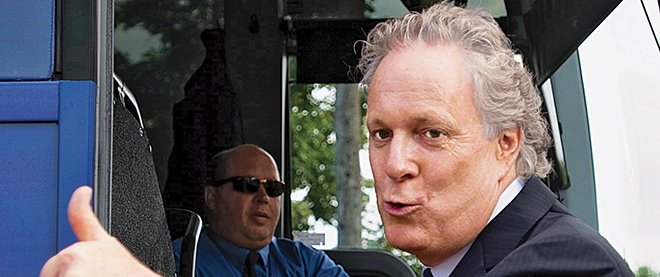Jean Charest, a reformer despite himself
Paul Wells considers how the premier got swallowed up by forces he hoped only to contain
Ryan Remiorz/CP
Share

In the current edition of Maclean’s magazine, published before Tuesday’s vote, Paul Wells considered the political legacy of Jean Charest:
If Jean Charest loses badly in the Sept. 4 Quebec election, the resulting political obituaries will not be gentle. Such promise he once held. A long career ends in a long summer of protest, corruption inquiries and collapsing highways. What a bum.
But take a step back.
In March of 1998 Charest was in a fix. He was the 39-year-old leader of the Progressive Conservative Party of Canada, already a 14-year veteran of the House of Commons, bruised from a disappointing result in the 1997 election but pretty sure he was doing good work at the head of the party that founded Canada.
Then Quebec’s business elite forced Daniel Johnson to resign as leader of the Quebec Liberal Party. An election loomed, Lucien Bouchard was the incumbent Parti Québécois premier, and Montreal’s plutocratic Desmarais family basically decided Johnson wouldn’t do. So out he went. The pressure on Charest to take over was irresistible.
Charest was the guy everyone liked in the 1995 referendum. We can debate the number of votes he influenced, but he waved a Canadian passport and spoke from the heart and for an extended moment, he looked like the best card Canada could play against the Bouchard menace.
He didn’t like any of it. “We should never put ourselves in the position where the future of the country depends on one individual,” he told the Calgary Chamber of Commerce. But that city’s most popular talk-radio host, Dave Rutherford, paid no heed, and when Charest showed up to speak on Rutherford’s open-line show, Rutherford took out a Maple Leaf Canadian flag and draped it around Charest’s shoulders. Television cameras recorded the moment. You’ve got to go to Quebec, Rutherford told Charest. You have to save Canada.
So off he went. And now, all these years later, it ends in rubble and depositions.
And yet. Work with me here a minute. What if, on that March day in 1998 when Rutherford was dressing Charest like a Canada Day parade float, teams of lawyers had appeared from the wings to turn the deal Rutherford was offering into legal language? What would “saving Canada” look like?
Sure, in an ideal world we would all love one another and the nation’s very name would be written in granite. But there is no Canada in an ideal world. So what version of “saving Canada” would it have taken for Rutherford to sign? Say Charest’s lawyers, after extended haggling, offered a minimum 14-year pause before the next secession referendum. Say they offered, as a bonus, the promise of a divided Quebec sovereignty movement still squabbling over doctrine well into the 21st century. And say they even threw in the apparent death of the Bloc Québécois as a force in federal politics.
One suspects Rutherford’s lawyers would have signed on the dotted line without further hesitation.
And all of these things have come to pass. Bouchard, who once seemed so imposing, won the 1998 election with a weak share of the popular vote. He had no standing to hold another referendum. Nor did his successor Bernard Landry. Charest defeated Landry with little difficulty. By 2003 he was the premier.
He’s mostly been a lousy premier. His dreams of “re-engineering” Quebec soon went by the wayside. He spent most of his first mandate struggling to show he even understood Quebec. He stalled on important reforms—he left university tuitions, for instance, frozen until 2008. He did not move to clean up party financing, and when the allegations against his own government mounted, he seemed honestly to believe it was the accusers who were the problem. He stalled until he was weak instead of moving to reform when he was strong.
But he hung on, for as long as any modern Quebec premier has hung on. While he was hanging on, the constitutional debates that made Canadian public life so joyless and distracted from 1976 to, say, 2000 did not reconvene. Charest had no interest in making the argument his predecessors Robert Bourassa and Claude Ryan favoured: that Canada did not deserve to survive if its Constitution could not be amended to suit the whims of Outremont intellectuals. Montreal’s economy recovered, and today the city’s downtown looks better than it has in 40 years, if you survive the drive in without having half of an overpass fall on you. Nothing’s perfect.
On his way to defeat, he implemented important reforms in the way most reforms actually happen in the real world: under fire and in a desperate attempt to avoid further humiliation. The Charbonneau commission of inquiry into corruption in the construction agency, the belated reforms to university financing, the woefully delayed attempts to pay what it takes to have public infrastructure that doesn’t crumble overhead: none of these was his bright idea, but they are in place, almost despite him, and his successors will benefit. He is Quebec’s Gorbachev, a reformer despite himself, swallowed up by forces he hoped only to contain. Like Gorbachev, he will look better in hindsight than he feels while it’s happening.
Enoch Powell said all political lives end in failure. What matters is the word “end.” Public life in a democracy is so cruel that taking a long time to fail is its own kind of success.
Is Charest’s political life really ending? He’s only 54. He once had a future in Ottawa. I cannot imagine he still does. But in his ungainly fashion he has defied imagination before. All I know is that he has been good for more surprises than almost any politician I’ve covered.